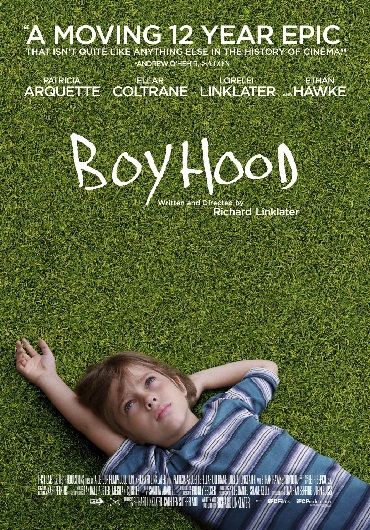Boyhood (2014)
Posted on August 16, 2014 by Mike Granby

Boyhood is the story of a boy named Mason and his journey from six year-old child to a college freshman. Filmed over twelve years with the same actors, its impact come not just from seeing the characters age via this device, but from its unique approach to storytelling. There are no huge plot points, no earth shattering revelations, and no plot twists. Mason’s life is like our own, and his story is therefore entirely accessible. There is no disbelief to suspend because this movie is above all about everyday life, and reality is portrayed so convincingly that we are not bored by its commonplace nature but instead led to observe and value of each of life’s moments.
In Boyhood, events stand on their own. They are not resolved. We see them happen and life moves on, just as is does in our everyday experience. We see Mason in a bathroom at school, being picked on by an obnoxious bully and his snarling lackey. In a conventional movie, further bullying would follow, and we would be led to a denouement in which the villain would receive his comeuppance, either at the hands of the protagonist or perhaps a kindly authority figure. But in Boyhood, none of this happens. The scene comes and goes. We see Mason’s reaction, and then we move on to another chapter. We sense that he was changed by this experience and we learn that he was pained by this intimidation, but we are not asked to believe that this is unique event that defined his development.
This pattern is established early, when Mason and his family move to another town. His best friend is seen – or rather half-seen – chasing their vehicle on his bike, waving to a part of his life that is leaving forever. But the picture is obscured, the other boy hidden by tufts of grass and other vegetation. This trauma, something that in a heavier-handed movie might serve as the key to explain the future behavior of the lead character, arrives and departs from the screen just as it does from Mason’s life. It hurts, and it adds to who Mason is becoming, but it is one in a stream of events that mold his character. The visual device of the obscured pursuer mirrors the fate of all memories, to fade and become unclear the very moment we move into the future.
The movie proceeds so much by this device that when we finally see a strong link between separated scenes, it appears almost incongruous. Halfway through the film, Mason’s mother comments to an immigrant laborer that he should go to college and better himself. And towards the close, we meet the same man, now managing a restaurant and the proud possessor of an associate’s degree that he hopes to convert to a bachelor’s. All is well, and a life has been turned around. But I found the scene jarring, not just because of its corniness, but because it seemed to be a bump in the movie’s otherwise smooth and consistent texture, taking me out of the flow of everyday life and dropping me back into conventional narrative structure.
The laborer-turned-manager also illustrates the movie’s commitment to a world where education per se is the route to happiness. We see the protagonist’s mother earn her degree and then find fulfillment in lecturing. We hear another character talk of teaching as the most likely path open to her after graduation. And we see a parade of freshman signing up for degrees that in reality are likely to consign them to years of debt and basement dwelling. Yes, Mason does question the conveyor-belt nature of the transition from high school to college, voicing his doubts about a destiny imposed rather than discovered. And, yes, the charming college lecturer with whom his mother becomes involved does not turn out to be any less flawed than the rest of the movie’s population. But the movie’s belief structure is clear, and perhaps not surprising given its parentage.
In the end, though, this is a quibble. The movie takes a unique narrative and cinematic approach, and turns what might have been a mere gimmick into an engaging portrayal of the opening chapters of a life. People come and go from Mason’s life, neither wholly good nor wholly bad, neither entirely positive nor entirely negative influences. Events happen, and life carries on, as it must. This acceptance of the flow of time, of the fleeting and happenstance nature of life’s events, is not a flaw, but the key to the movie’s emotional impact. Mason has his triumphs and he has his defeats, but, like the eponymous character in Paul Simon’s The Boxer, despite the carrying the reminders of the blows he has suffered, he remains, ready to face the rest of his journey.
back